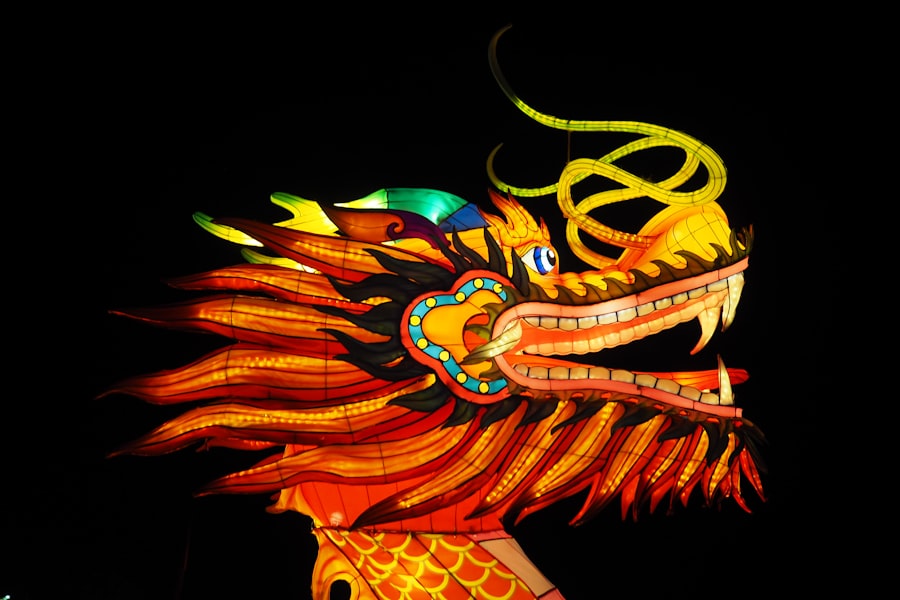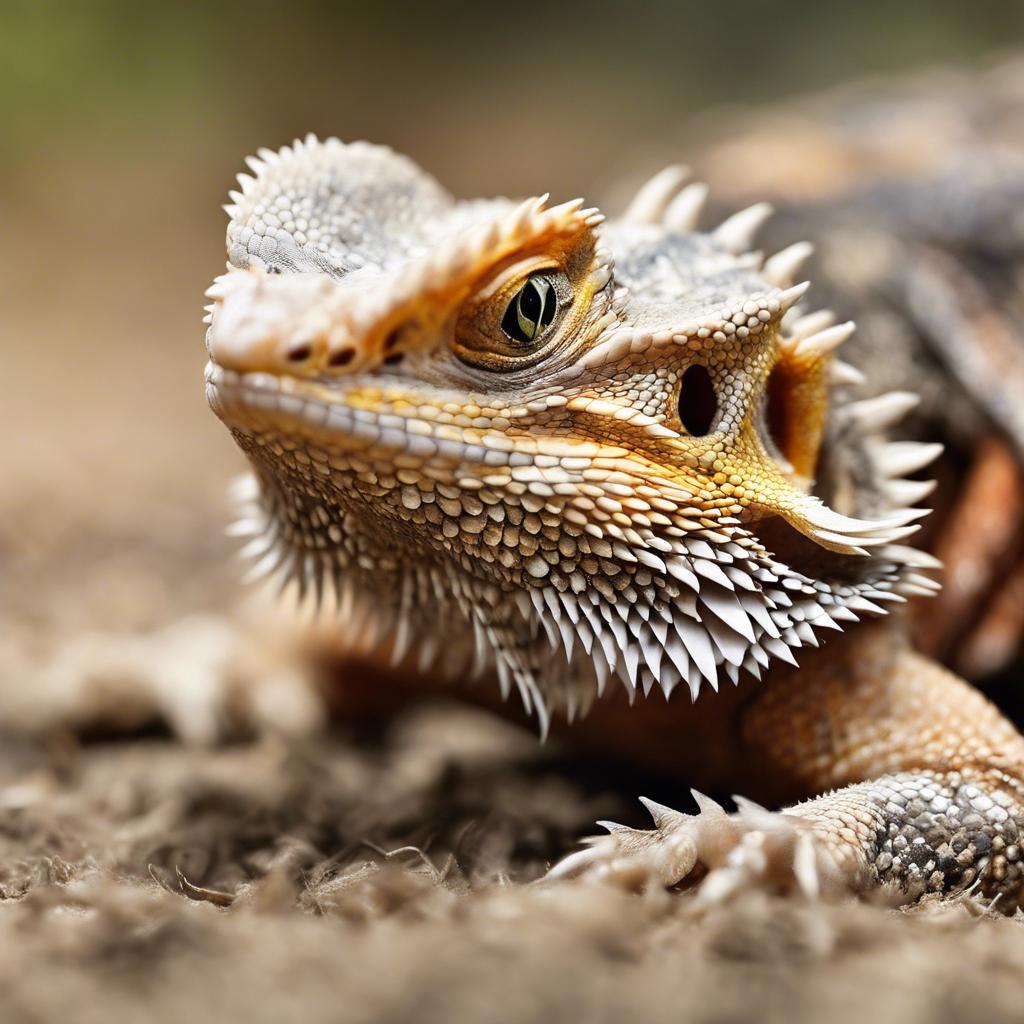Bearded dragons, scientifically known as Pogona vitticeps, are a popular choice among reptile enthusiasts as pets. These reptiles are native to the arid regions of Australia and have gained popularity due to their unique appearance and docile nature. Bearded dragons are medium-sized lizards that can grow up to 24 inches in length, with males typically being larger than females. They have a distinctive spiky beard under their chin, which they can puff up when they feel threatened or excited.
One of the reasons why bearded dragons are popular among pet owners is their calm and friendly temperament. Unlike some other reptiles, bearded dragons are known for their docile nature and can be easily handled. They are also relatively low-maintenance pets, making them suitable for both experienced reptile owners and beginners. Bearded dragons are diurnal creatures, meaning they are active during the day and sleep at night, which makes them more interactive and enjoyable pets.
Key Takeaways
- Bearded dragons are popular pets that require a balanced diet to maintain their health.
- Superworms are a common food source for bearded dragons, but they should not be the sole source of nutrition.
- Superworms are high in protein and fat, but low in calcium and other essential nutrients.
- Feeding superworms to bearded dragons can provide variety in their diet and help stimulate their appetite.
- However, overfeeding superworms can lead to obesity and other health issues, so it's important to feed them in moderation and offer other food options.
Understanding the Nutritional Needs of Bearded Dragons
Proper nutrition is crucial for the health and well-being of bearded dragons. In the wild, they have a varied diet that consists of insects, vegetation, and occasionally small vertebrates. As pets, it is important to replicate this balanced diet to ensure their nutritional needs are met.
Bearded dragons require a diet that is high in protein and low in fat. They need a variety of insects such as crickets, mealworms, and superworms to fulfill their protein requirements. In addition to insects, they also need a variety of leafy greens and vegetables to provide essential vitamins and minerals.
A balanced diet is essential for the overall health of bearded dragons. A lack of proper nutrition can lead to various health issues such as metabolic bone disease, vitamin deficiencies, and obesity. It is important to provide a varied diet that includes a mix of insects, greens, and vegetables to ensure they receive all the necessary nutrients.
Overview of Superworms as a Food Source for Bearded Dragons
Superworms, also known as Zophobas morio, are a popular food source for bearded dragons. They are the larvae of darkling beetles and are larger than mealworms. Superworms are rich in protein and fat, making them an excellent source of nutrition for bearded dragons.
Superworms are readily available in pet stores and can be easily bred at home. They are relatively easy to care for and can be stored for longer periods compared to other insects. This makes them a convenient option for pet owners who want to provide their bearded dragons with a consistent source of protein.
Nutritional Content of Superworms for Bearded Dragons
Superworms are highly nutritious and provide a range of essential nutrients for bearded dragons. They have a high protein content, which is important for the growth and development of these reptiles. Superworms also contain healthy fats, which are necessary for energy and overall health.
In addition to protein and fat, superworms also provide vitamins and minerals that are essential for the well-being of bearded dragons. They contain calcium, phosphorus, potassium, and other minerals that contribute to bone health and muscle function. Superworms also contain vitamins such as vitamin A, vitamin B complex, and vitamin E.
Compared to other common food sources for bearded dragons such as crickets and mealworms, superworms have a higher fat content. While this can be beneficial in providing energy, it is important to feed superworms in moderation to avoid excessive fat intake.
Benefits of Feeding Superworms to Bearded Dragons
Including superworms in a bearded dragon's diet can have several benefits. Firstly, superworms are an excellent source of protein, which is essential for the growth and development of these reptiles. Protein is necessary for muscle development, tissue repair, and overall health.
Superworms also provide a good source of healthy fats, which are important for energy and maintaining a healthy weight. The fat content in superworms can be beneficial for bearded dragons that are growing or need an extra energy boost.
Another benefit of feeding superworms to bearded dragons is their high calcium content. Calcium is crucial for bone health and muscle function in reptiles. By including superworms in their diet, bearded dragons can receive a good amount of calcium along with other essential nutrients.
Potential Risks of Feeding Superworms to Bearded Dragons

While superworms can be a nutritious food source for bearded dragons, there are some potential risks associated with feeding them in excess. One of the main concerns is the high fat content of superworms. Feeding too many superworms can lead to obesity in bearded dragons, which can have negative effects on their overall health.
Another risk associated with feeding superworms is the possibility of impaction. Superworms have a tough exoskeleton that can be difficult for bearded dragons to digest. If they consume too many superworms or if the worms are too large, it can lead to blockages in their digestive system.
It is also important to note that feeding live insects to bearded dragons carries some risks. Live insects can bite or injure the reptile if not properly monitored during feeding. Additionally, if the insects are not properly gut-loaded or fed a nutritious diet themselves, they may not provide the necessary nutrients for the bearded dragon.
How to Properly Prepare Superworms for Bearded Dragons
Before feeding superworms to bearded dragons, it is important to take certain steps to ensure their safety and health. Firstly, it is recommended to gut-load the superworms before feeding them to the reptile. Gut-loading involves feeding the superworms a nutritious diet for at least 24 hours before offering them to the bearded dragon. This ensures that the worms are packed with essential nutrients that will be passed on to the reptile.
It is also important to dust the superworms with a calcium supplement before feeding them to the bearded dragon. This helps to ensure that the reptile receives an adequate amount of calcium along with the other nutrients provided by the superworms.
Before offering superworms to bearded dragons, it is crucial to ensure that they are an appropriate size. Superworms that are too large can pose a choking hazard or cause digestive issues for the reptile. It is recommended to feed superworms that are no larger than the space between the bearded dragon's eyes.
Frequency and Quantity of Superworms to Feed Bearded Dragons
The frequency and quantity of superworms to feed bearded dragons depend on various factors such as age, size, and overall health of the reptile. As a general guideline, adult bearded dragons can be fed 2-3 superworms per day, while younger dragons may require more frequent feedings.
It is important to remember that superworms should not make up the entirety of a bearded dragon's diet. They should be offered as part of a varied diet that includes other insects, leafy greens, and vegetables. A balanced diet is crucial for providing all the necessary nutrients for the reptile's health and well-being.
Alternatives to Superworms for Bearded Dragons
While superworms can be a beneficial addition to a bearded dragon's diet, there are also other food sources that can be included. Crickets are a popular choice among bearded dragon owners due to their high protein content and availability. Mealworms, although lower in protein compared to superworms, can also be fed to bearded dragons in moderation.
In addition to insects, bearded dragons can also be fed a variety of leafy greens and vegetables. Collard greens, mustard greens, and dandelion greens are excellent choices that provide essential vitamins and minerals. Other vegetables such as squash, bell peppers, and carrots can also be included in their diet.
It is important to offer a variety of food sources to ensure that bearded dragons receive a balanced diet that meets all their nutritional needs.
Can Bearded Dragons Eat Superworms?
In conclusion, superworms can be a nutritious food source for bearded dragons when fed in moderation. They provide a good source of protein, healthy fats, and essential vitamins and minerals. However, it is important to consider the potential risks associated with feeding too many superworms or relying solely on them as a food source.
A balanced diet that includes a variety of insects, leafy greens, and vegetables is crucial for the health and well-being of bearded dragons. Superworms can be included as part of this varied diet but should not make up the entirety of their meals.
As responsible pet owners, it is important to research and understand the nutritional needs of bearded dragons to ensure they receive the proper care and diet they require. Consulting with a reptile veterinarian or experienced reptile owners can provide valuable insights and guidance on providing the best diet for your bearded dragon.
If you're curious about whether bearded dragons can eat superworms, you might also be interested in learning about their dietary preferences and potential risks. Reptile Wizard has a helpful article that explores the topic in depth. From discussing the nutritional value of superworms to addressing concerns about their hard exoskeletons, this article provides valuable insights for bearded dragon owners. To further expand your knowledge on reptile nutrition, check out this informative article from Reptile Wizard.
FAQs
What are superworms?
Superworms are the larvae of the darkling beetle and are commonly used as a food source for reptiles and other pets.
Can bearded dragons eat superworms?
Yes, bearded dragons can eat superworms as part of their diet. However, they should not be the sole source of food and should be fed in moderation.
What are the nutritional benefits of feeding superworms to bearded dragons?
Superworms are a good source of protein, fat, and fiber, which are essential for the growth and development of bearded dragons.
How often should bearded dragons be fed superworms?
Superworms should be fed to bearded dragons in moderation, no more than once or twice a week. They should not be the sole source of food in a bearded dragon's diet.
Are there any risks associated with feeding superworms to bearded dragons?
There is a risk of impaction if bearded dragons are fed too many superworms or if the worms are too large. It is important to monitor the size and quantity of superworms fed to bearded dragons.

